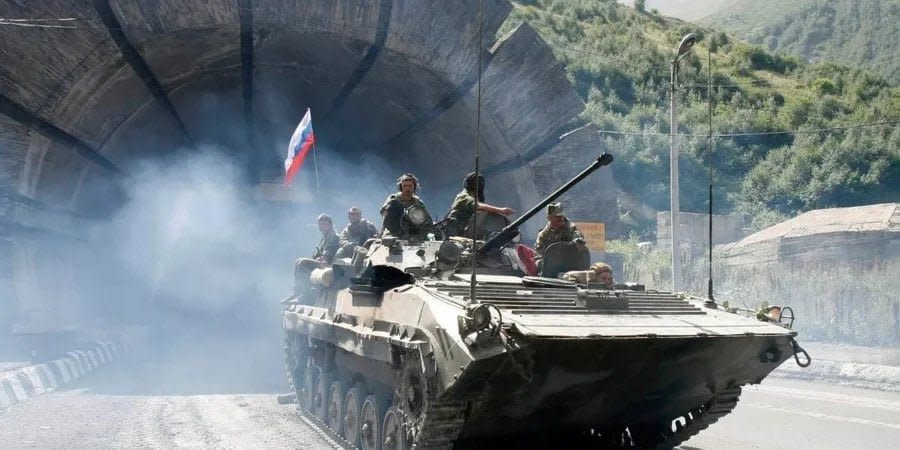15 years ago, Russia invaded Georgia under the pretext of supporting separatists

- Oops!Something went wrong.Please try again later.
Exactly fifteen years ago, on Aug. 8, 2008, Russia launched an invasion into Georgia.
The pretext for this incursion was Russia’s alleged support for separatist movements in Abkhazia and South Ossetia. This conflict is commonly referred to as the Five-Day War, the August War, or the War of 888.
Read also: Saakashvili says Putin wanted to seize Ukraine over 20 years ago
Here, we recap the key events that unfolded during this period.
On the night of Aug. 8, 2008, Georgia reported shelling of Georgian villages from the unrecognized republic of South Ossetia, accompanied by several provocations. Following this, Tbilisi declared its intention to reinstate constitutional order in the self-proclaimed republic. The Georgian military initiated an offensive operation, gaining control over the majority of Tskhinvali, the primary populated area in South Ossetia.
Russian forces directly intervened in this internal conflict, with Russian propagandist media accusing Georgia of intentionally shelling Tskhinvali.
Read also: Francis Fukuyama on Western attitudes towards Russia and 'overemphasized' corruption — interview
Notably, on Aug. 7, 2008, Russian troops began mobilizing toward the conflict zone. As former Georgian President Mikheil Saakashvili noted in Jan. 2022, Russia evacuated a portion of its diplomatic personnel from Tbilisi on this day and executed the first-ever large-scale cyberattack on Georgian government websites.
During the direct ground invasion by the Russian army, Russian tank brigades crossed the borders of the self-proclaimed entity of South Ossetia, entering the Kodori Gorge. Furthermore, Russia carried out airstrikes on Georgian cities, military installations, civilian infrastructure, and deployed naval forces.
The Naval Infantry of the Black Sea Fleet seized control of Georgia’s main port, Poti, and incapacitated all Georgian boats and ships with military designations during their raid, including border patrol vessels.
On Aug. 10, due to Russia’s direct intervention, Tbilisi declared the withdrawal of its troops from Tskhinvali and a unilateral ceasefire. President Mikheil Saakashvili endorsed a ceasefire plan put forth by the European Union, specifically proposed by President Nicolas Sarkozy of France (effective from August 12). The primary components of the plan encompassed a definitive ceasefire and the return of forces from both conflicting parties to their respective bases.
Despite these efforts, Russian forces continued to advance deep into Georgian territory, occupying the cities of Gori, Senaki, and Poti, and severing the strategic road connecting western and eastern Georgia.
On Aug. 26, the Kremlin officially recognized the “independence” of Abkhazia and South Ossetia, as decreed by President Dmitry Medvedev (in addition to Russia, these entities received recognition from Venezuela, Nicaragua, Nauru, and Syria). Concurrently, Russian forces maintained a presence on Georgian soil, in violation of the Sarkozy plan.
Subsequently, after the occupation of Georgian regions and the clearance of Georgian villages around South Ossetia, a ceasefire agreement was reached under the mediation of international parties.
Read also:
Georgia won’t impose sanctions against Russia, says Georgian PM
Georgian government describes rapprochement with Russia as ‘strategic policy of patience’
Although the withdrawal of Russian troops from Georgian territory was slated for completion by Oct. 1, 2008, Russian forces remained within the territories of the self-proclaimed republics, continuing to exert influence over Georgia’s internal and external policies.
In 2009, an international commission led by Swiss diplomat Heidi Tagliavini probed into the causes of the Russo-Georgian War, concluding that “Georgia initiated the hostilities, but Russia’s provocative actions contributed to the escalation.” Tagliavini’s commission findings faced critique within Georgia and EU member states for not fully establishing Russia’s accountability in escalating the conflict.
A faction of Georgian fighters who participated in the August war now persist in combat against Russia in Ukraine. According to Radio Free Europe/Radio Liberty, among the 48 Georgian fighters who perished in Ukraine over the past year and a half, 15 had participated in the August war.
We’re bringing the voice of Ukraine to the world. Support us with a one-time donation, or become a Patron!
Read the original article on The New Voice of Ukraine

